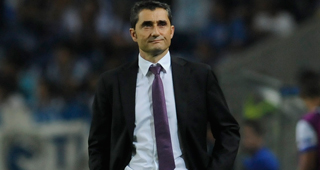To summarize Athletic Bilbao into an elevator pitch would involve a simple statement wrapped in layers of complexity. The simple part: founded 117 years ago in the Basque region of northern Spain, the club aims to use only players located within their autonomous region to fill their roster. The underlying difficulty: to uphold that mission statement, much less discuss the reasoning behind it, requires enormous historical context. As Patrick Redford wrote in his piece summarizing the club’s relationship to the region, in a world of big soccer brands, their recruiting policy is “who they are...their something is as brick and mortar as it gets”.
The first ever Basque Soccer Friendly in Boise took place last weekend between the aforementioned Athletic Bilbao and Club Tijuana. The match would signal the start of Jaialdi, a week long celebration of Basque culture held once every five years. With a migration period that began in the late 19th century and a population of 15,000 residents, Boise has the largest Basque community outside of Europe. Long gone are the early generations working rock bottom jobs as sheep herders with Basques in the city now holding considerable economic and political power. Boise mayor David Bieter is likely to be the only mayor in the country fluent in the language.
The behind the scenes organization of the friendly match displayed the breadth of this relationship between the Boise and European Basque community. The event was five years in the making, outlined on a napkin over wine, of course. The process of organizing a match featuring Athletic Bilbao gained momentum as organizer John Bieter, a history professor at Boise State University, assistant director of the university’s Basque Studies Center, and the mayor’s brother, developed the idea through the various pipelines unique to the culture of Boise, including Boise State University’s Basque Studies Program (which is partially funded by the Basque government and whose contract is renewed every five years during Jaialdi - the connection also meant Athletic waived their $300,000 appearance fee).
Debuting in 2007, the brief history of Club Tijuana (Xolos for short) is the sporting antithesis to Athletic’s storied existence. But with Mexican-Americans making up a tenth of the Idaho population, Xolos supporters noted that the friendly was just as much about supporting their culture, with several parallels between how early generations of both communities struggled to settle in Idaho. Besides, their supporters had been tailgating since noon too. Even the iconic blue field played its role, covered in 85,000 square feet of green turf, which would be donated to a local park. John Bieter made the observation that Albertsons Stadium is the largest classroom on campus. In the middle were two teams from Spain and Mexico.
***
Athletic Bilbao displayed their signature team traits in the first half in front of 21,000 fans. They opened the scoring three minutes in through ageless striker (and academy youth product) Aritz Aduriz. Their second goal 20 minutes later was signature Athletic - a high press forced an errant pass from the Xolos keeper, and one pass later, Benat (another youth academy product) walked the ball into the open net. The rest of the half featured a variety of questionable tackles, with Athletic striker Inaki Williams on the wrong end of a Rodrigo Salinas yellow card.
The match ended 2-0 to Athletic, the second half much tamer than the first as both sides emptied their benches. Both managers were quick to comment on the nature of friendlies after the match. If you win, nothing happens. If you lose, nothing happens. Xolos’ manager Ruben Omar Romano made passing comments about not seeing much of the city while training his side. Athletic Bilbao manager Ernesto Valverde noted how people in Bilbao would be surprised by the amount of support they have thousands of miles away.
Athletic’s direct play, high pressing, and closing off Xolos’ half of the field was thrilling to watch in a live setting (that style is as embedded in their DNA as Barcelona’s tiki taka - as Michael Cox notes, they are the most English style team in Spain). The style gained critical acclaim in 2012 with their performance against Manchester United in the Europa League, managed by the one and only Marcelo Bielsa. In a purely soccer sense, it’d be a shame to have to wait another five years to watch Athletic to play in America (there was The Beatles comparison thrown in for good measure). In a contextual sense, the pre-game tailgating, reading soccer articles on the front page of the local newspaper, and the post-match after party in downtown Boise featuring food trucks, DJs, and streets crowded with red and white jerseys were as vital to the overall experience.
In the meantime, both squads have a long season ahead. Xolos’ season starts this weekend at Pachuca. Valverde looked for attacking options to replace Williams, who was injured in a first half tackle. The side’s next competitive match, in either Israel or Azerbaijan, will start their campaign redeem last season’s Europa League disappointment. Then they open their league schedule against Barcelona. But considering their role in a festival highlighting the influence of globalization on Basque culture, a match where the result didn’t matter may be the most significant they play all year.




